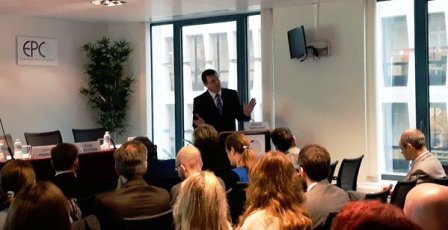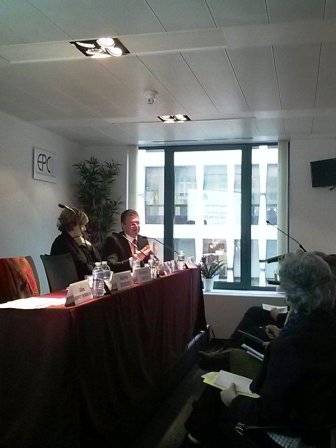Earlier today the European Policy Centre launched the Energy Poverty Task Force and examined the role the EU could/should play and what instruments could it use to address energy poverty across Europe in the presence of Vice-President for Energy Union Maroš Šefčovič.
Energy poverty is one dimension of the wider poverty challenge in Europe where nearly 11% of the EU’s population is unable to adequately heat their homes at an affordable cost. The tools for addressing the challenge at national and regional level vary from direct financial intervention to promoting energy efficiency and enhancing consumer awareness with price comparisons and transparent billing.
Vice-President Šefčovič in his introductory remarks mentioned that the launch of the Task Force on Energy Poverty by EPC is so timely, relevant, and impactful and addressed the issue of energy poverty in the EU and other social aspects of the Energy Union. The social dimension of the Energy Union and the energy transition in both the Energy Union Strategy and in the State of the Energy Union Report is personally important for Mr Šefčovič. A society is not measured only by its most successful researchers and entrepreneurs, but also by its ability to care for its weakest and most vulnerable. “And that is why all throughout our efforts to grow the economy, transform our technologies, and smarten our systems- we must constantly stop, look back and see if anyone was left behind” said the Commissioner.

He highlighted the ambitious targets the EU has set itself in being world leader in the integration of renewable energies, of developing new innovative and disruptive technologies, of growing its economy and improving the standards of living of its citizens and went through another social dimension of the Energy Union, the energy poverty. European consumers are today the most protected and they live in the most egalitarian continent in the world. However, 10% of European households cannot afford to heat their homes properly and EU must do more. Energy poverty is a reality in Europe, which we have to take into account when we elaborate our policies – also at EU level. Mr Šefčovič referred to some actions the Commission is taking like methodological building blocks, agreeing on some common definitions and getting data and the launch of the EU Building Stock Observatory which will include certain indicators on energy poverty, even though collecting data should not be an excuse for a wait-and-see policy.
According to Vice-President, 2016 is the year of delivery for the Energy Union. We have to translate our strategy into concrete action this year. Commission will put on the table a review of the electricity market design, the review of the Energy Efficiency Directive and of the Energy Performance of Buildings Directive which are an opportunity for new ideas and initiatives. Mr Šefčovič pointed out that he is not willing to ban the disconnections and added “Energy has a price, and we are working on a design which provides the right price signals for a more efficient use of energy, for the use of cleaner energy and for making investments in the energy sector attractive”. A few more safeguards could be established before someone is disconnected.
In addition to the disconnection issue, there are many mechanisms we can use in order to alleviate energy poverty such as: empowering consumers so that their bills are clearer and switching is made easier, ensuring a competitive and well-functioning internal energy market, improving the efficiency of residential houses through financial vehicles and ensuring Member States respect their obligation to protect vulnerable consumers bearing always in mind that a liberalized market also implies some responsibility.
He continued his contribution by referring to the financing of the Energy Union aspirations and targets and its social dimension. More precisely, he stated that the European Structural and Investment Funds are the largest sources of EU funding for energy efficiency in buildings and enterprises, with around €18 billion for the period until 2020 which will significantly contribute to the deep renovation of buildings across the EU, including social housing, while the Juncker Fund, the European Fund for Strategic Investment, has also invested in projects for the renovation of housing, e.g. in France.
EU must make sure that energy efficiency policies also help those who have financial difficulties. There should be a behavioral change by the governments, firms and consumers aligned to fight against energy poverty. There are many ideas and projects in Europe, and they can inspire many others and help young Europeans to acquire the right skills for the 21st century economy.
By concluding, he pointed out that the success of Europe is not only measure by our most successful but also by our care to our weakest and more vulnerable, and expressed his view that Europe will exceed our Paris pledge with our 2030 goals.
